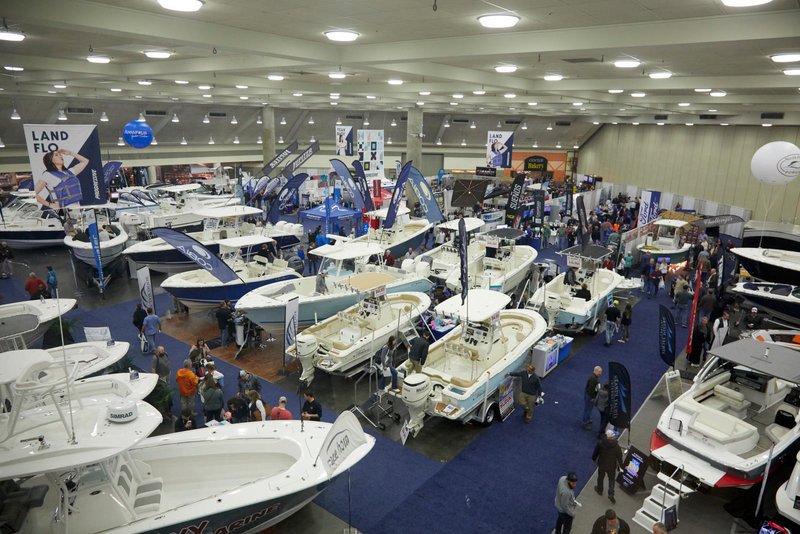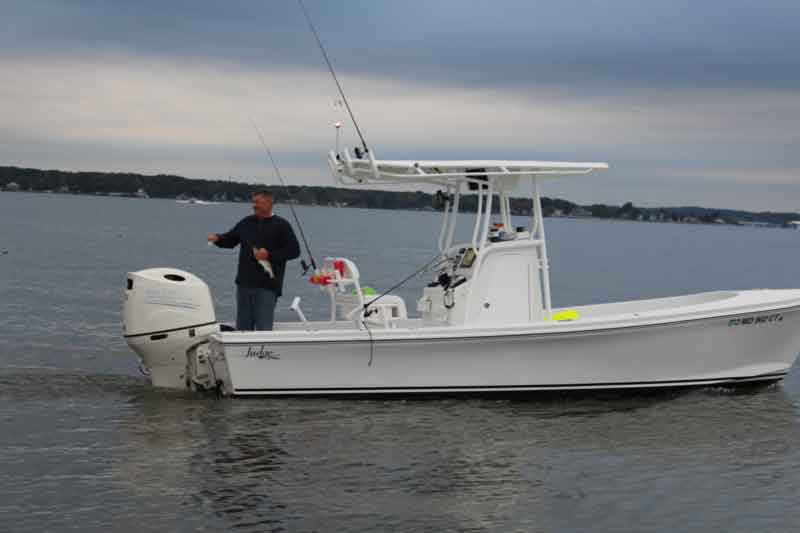With the Baltimore Boat Show in town (January 23 to 26 at the Baltimore Convention Center), anglers of all types have one imperative question on their mind: Should I buy a spankin’-brand-new uber-cool fishing boat this winter? The answer is of course, absa-fishing-lutely. The question you should really be asking is: do you know what to look for when shopping brand new boats? I get asked quite often what I look for when I review a boat, and while every make and model is different, there are a few things that everyone should do prior to deciding whether or not a specific boat is right for their needs. Thus, these 10 Commandments of Boat Shopping.

- Thou shall consider the fishing features relative to the way you fish. If you’re a die-hard jigger, who cares if the livewell is small and square? If you’re a troller, will that elevated casting deck ever come in handy? Many boats try to be all things to all people, but in truth there are visible advantages – and disadvantages – made for the different ways different people fish. And usually, they’re in plain view every time you step aboard a boat. So remember to focus on what’s important to you, personally, as you look at one.
- Thou shall stick your head into every cubby, compartment, locker, and bilge, and take a good look around. Most builders are extremely good at making a boat look pretty on the outside, but you’ll gain a valuable and in-depth understanding of how well a boat’s been put together and finished off by looking in all the places that the builder never expected anyone to look. On very high-end boats each and every compartment from the bilge to the anchor locker will be finished inside. The underside of every hatch will be smooth and gel coated. And there won’t be rough edges or exposed screw points under the gunwales or inside hatch frames. This attention to detail does, of course, come at a cost, and you have to expect it to be reflected in the bottom line.
- Thou shall bring a small flashlight when inspecting a boat. This goes hand in hand with the previous commandment, because when you peek into all those nooks and crannies it’ll be dark if you don’t have a flashlight on hand.
- Thou shall sit in every seat. You’ll discover that some seats look super-comfy, but turn out to be virtually unusable. You’ll find others that may be fine for some folks, but are positioned or mounted in such a way (such as height or the position of the backrest) that they simply don’t fit your body. You may discover foam cushions that turn out to be too thin, which bottom-out when you sit in them. And every now and again you’ll find one that fits juuuuust right.
- Thou shall manipulate every convertible item with your own hands. It may look really nifty when the dealer demonstrates how a lounge folds out of the inwale, or a seat converts into a sunpad. But that dealer’s probably done it 1000 times. Do it for yourself, so you’ll discover now if one part is too stiff or heavy for you to manipulate easily, or if another bends more than it should as you apply pressure. And remember, even though you’ll grow accustomed to tricky convertible pieces and parts on your own boat, you’ll often have people aboard who aren’t familiar with how they work. Damage can become an issue when people try to force things, so intuitive manipulation is important.
- Thou shalt not buy a boat without stipulating a sea trial. Yes, it’s the middle of winter right now and you want to cement a deal at the boat show. But if you’re looking at a boat you’ve never had off the dock, dealers are usually quite happy to make the sale contingent on a sea trial. So sign the papers and wait for a warm day when you can go for a test-run. Otherwise, if the boat doesn’t perform as you had expected, you could come to greatly regret your choice.
- Thou shalt not forget about the family. In conjunction with the above, while we heartily endorse getting as fishy a boat as possible, things like heads, extensive seating, and (shudder) even ski-tow bits can help a wider swath of the family spend more time aboard than they otherwise might. And in the long run, that probably means complete familial agreement when you think it might be time for an upgrade.
- Thou shall look up published performance figures, rather than asking someone to tell you off the top of their head. The reviews at FishTalkMag.com are one resource you can depend on (you’ll either see figures I gathered personally, or when quoting other’s figures they will be sourced and referenced). And in this day and age most outboard manufacturers publish performance reports. Some boatbuilders do as well, and in general they tend to be quite reliable. Neither outboard manufacturers nor boat builders was people to be disappointed by unrealistic expectations after they buy their boat so it’s rare to see exaggerations in these published reports. Meanwhile, different people run boats different ways, with different loads, in different conditions, and many don’t pay as much attention to monitoring the specifics as they should. So when you ask different people you’re bound to get very different answers – publicly published reports are far more reliable. Just remember one thing: they’re almost always performed with lightly-loaded boats, partial fuel loads, and few people onboard.
- Thou shall open everything that opens, and see what happens if you don’t close it. Does the console entry door swing freely? Does that hatch fall shut violently? Does that lid bang against fiberglass if it opens too far? It actually takes a rather shocking amount of engineering to make sure the many opening and closing pieces-parts of a boat don’t interfere with one another or bang around when the boat’s rolling at sea, and of course, we all want a well-engineered boat.
- Thou shall buy from a dealer he or she feels comfortable with. It’s easy to shop for price alone, but that doesn’t always mean it’s the best move. You’ll probably be interacting with your dealer for years to come for parts or regular maintenance, and you’ll want them in your corner if there are warranty issues. If a dealer leaves you with a bad taste in your mouth there’s a good possibility the overall experience won’t leave you satisfied. So make sure the folks you’re dealing with are people you can count on.

Repowering Your Boat
This is also a time when many of us will be shopping engines for a re-power on our old but beloved boat. If you’re thinking about replacing that ancient eggbeater with a brand new outboard, here are a few important “commandments” for you to think about, too:
Weight could be a critical factor. If the new rig is over 10-percent heavier than the existing powerplant, you need to be concerned about both aft freeboard and the running attitude of the boat. To get an idea of the effect additional weight will have, you should simulate it prior to making any big decisions. Using five-gallon buckets of water placed as far aft as possible will do the trick; water weighs a hair over eight pounds per gallon, so a full five-gallon bucket accounts for around 40 pounds of additional weight.
Brand Choice is naturally a top consideration. These days you can make a solid argument in favor of any of the major brands, but the final choice will likely dictate what shop hangs the motor and services it in the future. As with buying a boat, it’s critical you find a shop you feel confident you can trust. Also consider if switching brands will force you to buy new controls and gauges, or if sticking with the same one allows you to re-use the existing ones.
Size Matters and as a general rule of thumb most people are happiest when they power up to the max. Having maximum power also results in better resale value down the line. But don’t even think about going beyond the boat’s maximum rating. Yes, we know it’s tempting. But we also know plenty of people who’ve tried it and the boats invariably get squirrely and dangerous when full power is applied. On top of that, it can void your insurance.
Prepare to Swap Props. With repowers, choosing the best propeller for the job is usually a guessing game – and the first guess is rarely correct. Yet most people just accept that the boat performs the way it performs with the new engine and they don’t ever bother swapping out props to try different styles and sizes. But consider this: you could gain several mph at cruise and/or top-end for years to come, if you make the extra effort to find the ideal propeller.
Okay, you’ve got these Commandments emblazoned in your brain? Now ready, set, go boat shopping!